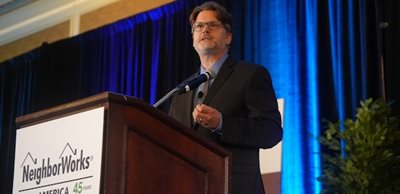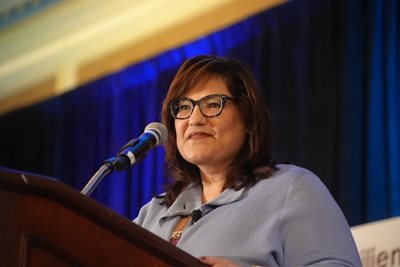 Since 2021, the country has lost more than 2.1 million housing units that rent for less than $600, and more than 4 million units renting for between $600-$999 a month, according to Michael Butchko, NeighborWorks America's vice president for Business Intelligence, Corporate Strategy & Impact. Where there have been gains has been in housing that costs more than $1,400 a month.
Since 2021, the country has lost more than 2.1 million housing units that rent for less than $600, and more than 4 million units renting for between $600-$999 a month, according to Michael Butchko, NeighborWorks America's vice president for Business Intelligence, Corporate Strategy & Impact. Where there have been gains has been in housing that costs more than $1,400 a month.
"The median amount left after paying rent was $310 a month," Butchko explained to more than 250 representatives of the NeighborWorks network – heads of organizations and their seconds in command – who gathered this week in Washington, D.C., for the annual NeighborWorks Executive Symposium.
That the housing market is tough right now was not a surprise to those who gathered for the event. The affordable housing and community development leaders live those numbers every day.
But as Butchko laid out the data, leaders from across the NeighborWorks network scrutinized it anew, asking questions and strategizing ways to combine their energy to continue to make a difference.
How accesible is the rental market? For every 100 adults classified as "extremely low income," there are 33 rental units available, Butchko said.
Meanwhile, home sales have continued to decline, the homeownership rate has remained flat, and interest rates have remained high, Butchko said. To add to the pressure, insurance costs are rising while coverage is decreasing. Residential foreclosure shows signs of increasing "and we're keeping an eye on that."
But the news wasn't all bad. "The network is showing an increase in homeownership mitigation where the home was retained," Butchko said. "In the face of these challenges, the NeighborWorks network continues to provide safe, decent affordable housing for the clients you serve."
And since 2013, the network has added nearly 90,000 units to its portfolio. There are more in the pipeline. "One hundred seventy three organizations report 57,000 rental units will come online between now and 2026," Butchko said. "Growth appears to be in our future."
Butchko also provided data on the network as a whole. Network leadership itself has reflected changes in demographics. In 2019, 80% of executive directors identified as white. By 2023, that number decreased to 68%; 32% of the leaders identified as leaders of color. Just over half identified as male. Meanwhile, more than a quarter of senior leadership were hired during COVID, reporting a tenure of 2 to 4 years. The leader with the longest tenure has 43 years of service.
The theme of this week's symposium was "Resilience and Beyond: Iterate, Accelerate, Innovate," and leaders seemed to take that to heart. The conversation was frank. But the mood centered on determination.

"On our 45th anniversary, we're reflective about the impact we've made," said Marietta Rodriguez, president & CEO of NeighborWorks America, who, along with Butchko presented a "state of the union" for the network. Doing work in this field "is a personal choice," she said. "All of you in this room do the work and make that personal choice."
As NeighborWorks deals with a cut to its Congressional allocation, the focus will continue to be on providing grants and expertise to the network, and to help the network tap into dollars available in other places, including some of the federal dollars available to combat climate stress through the Inflation Reduction Act.
Lee Ann Adams, NeighborWorks' senior vice president, National Initiatives, said she's heard organizations say they don't do climate work. "But how many of you do weatherization?" she asked. "How many of you do owner-occupied rehab? How many of you are doing solar? You're doing this work and there's money on the table."
Part of the power of the network is the ability to share information and ideas for solutions. Groups met during the day in a peer-to-peer setting to discuss subjects such as shared equity housing, Black wealth and asset building, transitioning to new leadership, staff retention and dealing with the opioid crisis. Being together with people facing the same challenges can make a difference, said Dr. Bill McKinney, executive director of New Kensington CDC.
The day ended with an awards ceremony, recognizing Stuart J. Mitchell III with the NeighborWorks Founders Award for his more than 50 years of serving and innovating. Mitchell told the audience that they were all founders. "I still have great faith in the future," he said. "I appreciate all of us for the work we do."
The NeighborWorks Network Association presented awards as well, its 20th year of doing so.
- The Emerging Leader Award went to Stephanie Quick, president of Intend Indiana. "I don't do the work for recognition or praise. I do it because the work reflects my life, my family's life, my community's life," she said.
- NeighborWorks Northeastern Pennsylvania received the Organizational Impact Award. Outgoing President & CEO Jesse J. Ergott accepted the award with incoming President & CEO Shane Powers.
- The Richard H. Stallings Lifetime Achievement Award was presented to Martina Guilfoil, president and CEO of Chattanooga Neighborhood Enterprise. "Empowering residents isn't just about providing them with affordable housing," she said. "It's about equipping them with the tools they need to chart own course."

